In today's column, the topic is Jorge Lafond. Actor, dancer, transformer, he was one of the most emblematic figures in the Brazilian LGBT universe, for better or worse – just like Clodovil, the subject of the first edition of this column, Lafond was loved and celebrated by some and repudiated by others.
Born in Rio de Janeiro in the Penha neighborhood in 1953, Jorge Luiz Souza Lima, even as a child, already saw himself as homosexual. He started working very early in a mechanic shop and also in an amusement park.
As a teenager, he began studying ballet and Afro dance, and graduated in theater from UniRio. Afterwards, he started to do shows in Rio's hellholes and cabarets, covering the entire nightlife of the city, from Copacabana to Irajá, passing through Praça Mauá. He performed at the legendary nightclubs Florida, Scandinavia, Barbarella and Kiss.
Still in the 70s, Lafond traveled around Europe, joining a folkloric dance group directed by Haroldo Costa. Upon his return, in the 80s, he ended up on TV – first in the corps de ballet of "Fantástico", in 1982, and then participating in the network's comedy shows and musicals, such as "Viva o Gordo" and "Os Trapalhões". She also appeared in cinema, appearing in roles in films such as "Rio Babilônia" (82) and "Bete Balanço" (84).
By this time, his androgynous and provocative image was already known in the media, and in 1987 he acted in the soap opera "Sassaricando", by Sílvio de Abreu, in the role of Bob Bacall – star of an underground cabaret where members of the secret organization "Ela " met.
Bob Bacall was already a prototype of the character that would establish Lafond once and for all: Vera Verão. Playing this creation in the SBT comedy "A Praça é Nossa", the actor became known throughout the country. He played Vera for ten years.
"Vera Verão" became slang and synonymous with affected gays or chicks. It began to be used as insults and bullying practices in schools and streets in Brazil, while Lafond's image became increasingly linked to the character.
LGBT activists in the 90s began to despise Vera Verão, as the character supposedly reinforced prejudices and stereotypes about gays. In 2001, Lafond was invited by the Ministry of Health to work on a campaign to prevent sexually transmitted diseases, generating new criticism from the GGB – Grupo Gay da Bahia.
And Lafond himself ended up adding more fuel to the fire, by speaking openly about his homosexuality, culminating in the release, in 1999, of his autobiography – "Vera Verão: Bofes e Babados".
In the work, the actor talked about his romances and boasted about having had an affair with a famous football player. After threatening to reveal the player's identity, Lafond changed his mind and ended up not saying who the athlete was.
He also made a point of parading at Carnival, in Rio and in São Paulo, and increasingly used outfits – or lack thereof, as he paraded half-naked a few times. His extravagant attitude ended up attracting intolerance and hypocrisy from some. The episode involving Father Marcelo Rossi, in November 2002, became famous.
Lafond was participating in the program "Domingo Legal", then presented by Gugu Liberato on SBT. Marcelo Rossi sang and prayed on the program and, before going on stage, asked that Lafond be removed from there.
The production of the program – amazingly – obeyed the priest and Lafond went backstage. Faced with general uneasiness, the production backed down and called Lafond back to the stage. Shaken, he refused to return.
That night, Lafond went to do his usual show at the São Paulo nightclub Freedom, of which he was one of the partners. The actor introduced himself and joked with the audience, but ended up venting and telling everything to those present.
After the episode, Lafond was hospitalized twice because of his blood pressure – he was hypertensive. The actor began to suffer kidney complications and fell into depression. A few months later, on January 11, 2003, Lafond suffered a cardiorespiratory arrest and died in São Paulo.
The actor's funeral, in Rio, attracted around 5 thousand people, who applauded Lafond and said goodbye to him, proving that the charisma and public sympathy he created were greater than the prejudice and intolerance of which he was a victim, as well as , regardless of labels, stereotypes and grammar, continues to happen to thousands of "Beeshas from Brazil".


